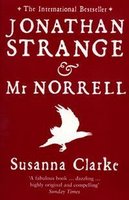Set in England during the early 1800s and the Napoleonic war, this is the story of two magicians who bring "practical magic" back to England. Norrell is a little, scholarly gentlemen who wants magic to be respected and important, but also wants it under control-- he wants to be the only magician (which he very nearly accomplishes), and he wants everyone to think the way he does about English magic. Strange is younger and more charismatic, and much less restrained in his practice and theories about magic. Norrell is particularly vehement that fairy magic and the legendary Raven King, the mysterious and powerful magician king of northern England (as well as parts of fairy and another land beyond Hell), should not be considered so central to English magic.
The book is narrated in a very pleasant, witty voice that some of the blurbs on the book compare to Jane Austen-- which seems fairly apt. When Norrell comes to London, the two men who immediately befriend him and begin introducing him to the rest of polite society (all the while making sure that they are his particular friends and advisors) are really quite dandies, social butterflies. One of his first magic acts is bringing a young woman back from the dead, and I love the way the narrator describes society's response:
It has been remarked (by a lady infinitely cleverer than the present author) how kindly disposed the world in general feels to young people who either die or marry. Imagine then the interest that surrounded Miss Wintertowne! No young lady ever had such advantages before: for she died upon the Tuesday, was raised to life in the early hours of Wednesday morning, and was married upon the Thursday; which some people thought too much excitement for one week.The book is also written with lots of footnotes-- sometimes references to books by or about Strange or other magical tomes, but often other stories of magicians and fairies that are quite entertaining. Sometimes the footnotes seem a bit overwhelming (going on for pages), but they also seem quite appropriate to these gentlemen magicians who are far more scholarly than we might usually imagine.
The book also deals with some very interesting issues of class and race. Norrell has a servant, Childermass, who is incredibly useful, and has picked up some magic of his own; he's also quite capable of reading things in the Tarot cards, in spite of Norrell's disapproval. But in spite of all he does, Norrell does not trust Childermass or treat him like an equal the way he does with Strange. Another very interesting character is Stephen Black, a butler of African descent. The fairy who figures quite a bit in the book (always described as "the gentleman with the thistle-down hair") meets Stephen and takes quite a liking to him-- sees him as regal and wise, and gives him all kinds of gifts, and wants to make him king. While I don't think we are meant to completely trust the fairy's opinion, since he is capricious, selfish, and bloodthirsty, he certainly recognizes something in Stephen that most of the Englishmen around fail to notice. Stephen does reflect at one point on the strange fact that slaves are not allowed on English soil, but Englishmen are allowed to hold slaves elsewhere.
There is so much in a book this long, and I can't comment about everything. There's a delightful sequence where Strange accompanies Lord Wellington on his campaign against Napoleon, and Strange often moves parts of Italy around to suit Wellington and his troops, but forgets his promise to move them back when the war is over. The final section is impressive; we finally get a glimpse of John Uskglass, the Raven King, and see that he hasn't abandoned England completely (as many thought). His book of prophecy (now on the skin of the street-magician Vinculus-- which is a strange and delightful thing, to have this character be the book) was being fulfilled by the very actions of Norrell and Strange as they attempted to bring magic back to England, and Uskglass has much larger purposes and a great deal more power than either of them could imagine.
| Title: | Jonathan Strange & Mr. Norrell |
|---|---|
| Author: | Susanna Clarke |
| Date published: | 2004 |
| Genre: | Historical Fantasy |
| Number of pages: | 1006 |
| Notes: | Read in two weeks |



0 comments:
Post a Comment